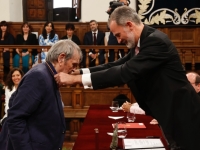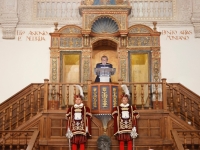Arts
“Nationalism oppose development; It is urgent to defend democracy”
Rafael Cárdenas, Cervantes Prize
USPA NEWS -
The King and Queen of Spain, Felipe VI and Letizia, presented this Monday to the Venezuelan poet Rafael Cárdenas the Miguel de Cervantes Prize for Literature in the Spanish Language, granted by the Ministry of Culture and Sports and endowed with 125,000 euros. The winner made a fiery defense of democracy in a committed speech, with which he recalled the Venezuela before Chavismo.
“The current political chaos is related to the decline of language and we could achieve some improvement if we started with the verbal,” Rafael Cárdenas said. “It is urgent to defend [democracy] from everything that threatens it, and for this it is necessary to recreate it. That task falls to education, which has neglected it. It is needed in countries where there is a pedagogy that strengthens it; in others, who have not known it, it is vain to try to introduce it. Democrats should call out for its renewal,” he added. And he recalled that “the imprint of Don Quixote was on the believers of the Utopia that would fix everything and ended in disappointment. It is known that nationalism, ideologies and creeds divide human beings, but at this time, the world, thanks to the development of communication, should be cosmopolitan; In a certain way it already is, but the factors I have mentioned oppose it, especially nationalism.”
For Cárdenas, this award is not a dream come true "but a job for everyone, doable only with full freedom," he said, and in his speech he recalled his beloved Central University of Venezuela, where he was a student during the years of the fight against the dictator Marcos Pérez Jiménez and professor later in years of democracy, and especially the Nicaraguan writer Sergio Ramírez, "whom I admire, with my wish that he can return to his country."
“Cervantes was a great defender of freedom. I will remember his well-known words, although they should be more widely known: 'Freedom, Sancho, is one of the most precious gifts that men gave to heaven; with her cannot be matched the treasures that the earth encloses nor the sea conceals; Life can and should be risked for freedom, as well as for honor, and on the contrary, captivity is the greatest evil that can come to a man,” he concluded.
After the winner, the King of Spain took the floor. Felipe VI highlighted the work of Rafael Cárdenas that "is that of a great modern poet. That of someone who does not want 'style, but honesty,' a very valuable ambition; an aspiration that entails 'righteousness, integrity in acting,' according to our Dictionary of the Royal Spanish Academy. A magnificent, admirable purpose.” He also stressed that "it is a pleasure, and an honor, to have given Rafael Cárdenas the highest award for letters in the Spanish language, which already belongs with all honors to the lineage of Don Miguel de Cervantes y Saavedra."
This Tuesday, Felipe VI and Letizia will offer the traditional lunch at the Royal Palace of Madrid that will bring together authorities, academics, editors, critics, professors, booksellers and writers, and in which the winner will be honored.
The jury awarded the Cervantes prize to Rafael Cárdenas for "his vast and extensive literary work," recognizing "the transcendence of a creator who has made poetry a reason for his own existence and has taken it to heights of excellence in our language." According to the jury, "his work is one of the most important and demonstrates the transformative power of the word when language is pushed to the limit of its creative possibilities." Cárdenas "makes words distill their dazzling essence, placing them in the dual territory of sleep and wakefulness and making his poems a profound expression of existence itself and of the universe, also placing them in a dimension that is both mystical and earthly."
A vast literary work
Rafael Cárdenas (Barquisimeto, Venezuela, 1930) belongs to the Venezuelan generation of the 1960s. He was part of the Tabla Redonda group, along with Arnaldo Acosta Bello, Jesús Guédez, Ángel Eduardo Acevedo, Darlo Lancini, José Barroeta and Sanoja Hernández. He is a translator of English poetry, was a university professor and has an extensive work of essays considered a reference for contemporary literary thought in Spanish, with titles such as 'En torno al lenguaje' and 'Notes on San Juan de la Cruz y la mística'.
Cárdenas, who is still active, is the author of more than twenty books of international resonance, including 'Cantos iniciales' (1946), 'Una isla' (1958), 'Los cuadernos del destierro' (1960, 2001), the poem 'Defeat' (1963), 'False maneuvers' (1966), 'Outdoors' (1977), 'Memorial' (1977) 'Lover' (1983), 'Dichos' (1992), 'Gestiones' (1992), ' Anthology' (1958-1993, 1996, 1999), 'Lover' (2002), 'Selected Poems' (2004, 2006, 2009), 'The workshop next door' (2005), 'Open envelope' (2012), 'About Basho and other issues' (2016) or 'Answers' (2018).
The poetic and essayistic work of Rafael Cadenas has earned him recognition, among which are the San Juan de la Cruz Award (1992), the Mozarteum Foundation Award of Venezuela (1993), the FIL Award for Literature in Languages Romances (2012), the Federico García Lorca International Poetry Prize (2015), the Reina Sofía Prize for Ibero-American Poetry (2018), and various recognitions in his country, such as an honorary doctorate from the Central University of Venezuela and the Andrés Bello Prize from the Venezuelan Academy of Language, among others.
Liability for this article lies with the author, who also holds the copyright. Editorial content from USPA may be quoted on other websites as long as the quote comprises no more than 5% of the entire text, is marked as such and the source is named (via hyperlink).







